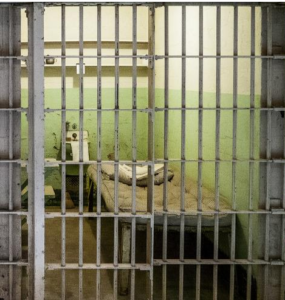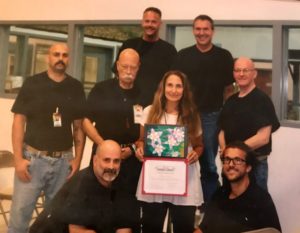Category — prison
Just mercy

Just Mercy. That’s the title of Bryan Stephenson’s deeply compassionate (and best-selling) book about crime and punishment. More specifically, it is about those who are being punished for crimes they did not commit. The book, both thoughtful and angry, chronicles the efforts of Alabama’s Equal Justice Initiative to free a number of innocent people (many of them Black, most of them men) who have been in prison for sometimes many decades.
It is not only easy to be outraged by these cases, it also easy to feel kind-hearted and sympathetic to the people in prison. They don’t belong there. They are innocent. It is the same for those who, because of the extraordinary efforts of various Innocence Projects across the country, are exonerated and released from prison. They didn’t belong there in the first place. It is also easy to feel compassion for a woman like Blanche Wright, the subject of a compelling New York Times story , who was, in fact, guilty of violent crimes but was herself the victim of an almost unimaginably brutal childhood and then later the victim of a certifiably psychopathic “boyfriend” who coerced her into evil.
But what Bryan Stephenson says about “just mercy” at the end of his book is this: “The power of just mercy is that it belongs to the undeserving.” The undeserving. Not just the wrongly accused. Not just the woman with the horrific backstory. Not just the people for whom we immediately feel compassion. For the others. The guilty ones. The ones who did bad things and deserve punishment. Do they also “deserve” mercy and forgiveness?
I think about this every time I walk through the three sets of clanging gates at Oregon State Penitentiary, the gates that separate my world from the world of the men, Lifers, convicted murderers, in the writing group I’ve been running there for now four years.
I am not a naturally forgiving person. I come from a long line of grudge holders. Working with these men, getting to know some of them better than I know most of my friends, I have discovered how shallow my well of compassion is for the “undeserving.” And I have worked on, am still working on, will always be working, digging a deeper well.
These are the men I wrote about in A Grip of Time: When prison is your life. This is the book’s official publication date.
May 1, 2019 2 Comments
Abolish prisons

Abolish prisons?
Are you kidding? What would we do with all the evil doers, the people who make and sell drugs, who steal, who rape, who kill?
People, many people, even the current president, talk about prison reform. But closing down prisons? That is unthinkable.
Well, think about it.
As Ruth Wilson Gilmore, a leading prison abolitionist, suggests in a recent New York Times story: We should think about why we try to solve problems by repeating the kind of behavior that brought us the problem in the first place. That is, in response to violence and cruelty (the bad guys, the criminals) our penal system (the good guys, civil society) chooses to model vengeance and cruelty.
Few people would (or could) argue that U.S. prisons are anything other than grim, dangerous, angry, unhealthy places where those who have done bad things experience, every day in every way, more bad things. The world they live in behind those walls, behind those bars, is a brutal world where no one can be trusted and kindness is suspect. Our prisons model the worst behavior of the people we incarcerate. That’s Ruth Gilmore’s point.
I write about the origins of the penitentiary in my new book, A Grip of Time. Unbelievable as it may seem, incarceration was an Age of Enlightenment reform, designed as a humane alternative to beatings, stonings, burnings, torture or death. But the penal system has transformed into a mega-institution of modern life that is not known, even by its supporters and administrators, for its humanity. Or its enlightenment.
As Gilmore makes very clear, abolition can only be seriously considered if we create vital systems of support that many communities lack, a network of services (education, health, employment, housing, counseling) that would get people the resources they need long before the hypothetical moment when, as Gilmore puts it, they “mess up.” This community support, this humane treatment, models the behavior we want to see. Prison does the opposite.
I would never argue against prison reform. But…what’s the cliché?…rearranging deck chairs on the Titanic? Better we should look to the Scandinavian countries who have created an entirely different system that, from day one, models humane, pro-social behavior. Best, we should seriously consider spending some of the $182 billion a year we spend on mass incarceration on creating communities that do not breed crime and on helping the people who need help.
April 24, 2019 4 Comments
Celica

You know how there are some things that are both wonderful and terrible at the same time?
Like an erupting volcano: A stunning display of crimson and gold fireworks. A destructive force that obliterates land and people.
Celica is like that. Celica is a trendy, arty hostel. That used to be a prison. On the one hand, how wonderful to repurpose this grim building with its grim history. On the other hand, how borderline despicable to market it as “spend the night behind bars!” to globe-trotting, privileged millennials. Because, you know, millions of unprivileged people spend thousands of nights behind bars in these cells.
A bit of history: In 1882 the Austro-Hungarian Army built a military barracks just outside the old city of Ljubljana (the capital of today’s Slovenia, then part of the Austro-Hungarian Empire, later subsumed in Yugoslavia). One of the buildings in the barracks was a prison. It operated as such for more than 100 years.
Fast-forward to 1991 when Slovenia declares its independence from Yugoslavia. The army departs. The barracks are abandoned. Thus follows a battle (mostly bureaucratic, but occasionally more than that) between the city of Ljubljana and a group of artists and activists who want to transform the barracks into a cultural center. At one point, the activists illegally occupy the barracks buildings. At one point the city switches off the electricity and water supply to the area. (If you know anything about the history of Copenhagen’s Christiana, this will sound familiar.)
The activists go forth anyway. More than 80 local and international artists defy the authorities and involve themselves in the project, transforming the cells into what you see here. Finally, the city grants approval, and the hostel opens in 2003.

What I hope is that the hipster backpackers who pay up to 35 euro (free WiFi) to sleep in an upscale prison cell honor the history of that place, understand their privilege and maybe, even, work for a more humane system of punishment. What I hope is that they think the experience of Celica is both wonderful and terrible.
How do people who live behind bars actually live, day to day? Not the Hollywood version. Shouldn’t we know how they live when we sentence them for years, decades, or life? I end this post with a shout-out for my new book, A Grip of Time: When prison is your life. I hope you’ll read it.

April 17, 2019 2 Comments
Goodbye without leaving*

A year ago, almost to the day, I sent in the manuscript for A Grip of Time: When prison is your life. Some people think that finishing a big project like this is exhilarating, that crafting that last sentence in that final chapter is a celebratory moment. It isn’t. At least not for me. I do not celebrate. I mourn.
Whatever it is I am in the grips of—from this project that hopes to illuminate life behind bars to my other deep dives in hidden subcultures—I am consumed. That world, whatever it is, is my world. I don’t just write about it. I live it, I dream about it. In time I know more about the people I meet, the people who allow me into their world, than I know about most of my friends. I care about them. I care about what they care about. And I never want to leave. I never want to say goodbye. But when I finish a manuscript I do have to say goodbye.
Or do I?
A year ago, almost to the day, I sent in the manuscript for A Grip of Time. But today I will once again drive up to Oregon State Penitentiary to lead the twice-monthly Lifers’ Writers Group, as I have for the past four years. The group, which fueled my in-the-trenches research for the book, is no longer providing material. The book is finished. The book will be out and published May 1. But I have not and cannot say goodbye to the men who write stories that need to be heard, the men I listen to and encourage, the men who crave editing and feedback like no students I have ever had. Whatever I have taught them, they have taught me far more. And so I return.
Last time I was at the prison, I asked the men to write about what writing meant to them. Here is what Jimmie wrote:
For most of my life I felt powerless. When a friend asked me to participate in a writing group, my first thought was, I can’t write. My next thought was, I’ve been incarcerated for thirty years, what the hell did I have to say? Whether I am a good writer or not is debatable. What writing has done for me is empower me. It is something that no one can take away.
And so I return.
*I love Laurie Colwin.
March 20, 2019 2 Comments
Falling in love again


I’ve fallen in love with teaching again.
For this I owe a debt to the smart, creative, focused “stories spark change” graduate students in my University of Washington CommLead storytelling seminar. They are public radio journalists, freelancers, videographers, nonprofit communications specialists, techies, veterans, mothers, fathers. They work all day. Then they spent high-energy Saturdays with me delving into the art and craft of narrative, learning how to tell important stories in compelling ways. And no one nods off. And when five o’clock comes, no one rushes for the door.
And I owe a debt to the forward-thinking, “best and brightest” Austrian journalists I work with, both in Europe and in Seattle, who do not have to be persuaded that journalism matters. They know it does. They live it every day.
But my biggest debt is to the men in my writers group at Oregon State Penitentiary, felons all, murderers most, and some of the best read, most thoughtful, most attentive, most generous, most open to (craving of) constructive critique of any group I’ve ever worked with. Every hour spent with them—and I’ve spent hundreds during the past four years—has been inspiring, enlightening, harrowing (not for my safety but for the stories I hear) and bone-deep satisfying.
There was a time, four or five years ago, when my love of teaching (long a complement to my writing life) was at an all-time low. I was unhappily immersed in “academic life” (which, alas, is not synonymous with teaching) as a full-time full professor. I was expending energy fighting for programs I believed in (and generally losing). I was wasting time (and becoming the kind of person I didn’t want to be) battling over turf. I was spending far too much time sitting in meetings where the people who actually held the power pretended that you had a say. I was working with people who pretended to like each other but didn’t.
I should have left before I did. But that regret has now been effectively scoured. I have learned—these new students of mine have taught me—how to love teaching again.
March 6, 2019 5 Comments
The long haul

“I just want to know one thing,” Jimmie said to me a few months back. Jimmie is a stalwart member of the writers’ group I’ve been running for almost four years. He’s one of eight guys, all convicted murderers serving life sentences in a maximum security prison, who meet with me twice a month to write about their incarcerated lives.
Jimmie’s been inside for 38 years. He’ll be 61 in a couple of months. Another of my writers has spent the last 35 years of his life locked up. He’s 66. The oldest in the group just turned 79. The youngest, about to be 40, began serving his life sentence when he was 17.
When I started this group there were just three guys and me, me nervous and sweaty, me never having set foot in a prison before, me imagining every jailhouse movie cliché and wondering when I’d be shived. Or worse.
Now I don’t think of these men as convicts or inmates or felons or murderers. They are writers. Our agreement, early on, was this: I would teach them how to grab hold and make sense of the narrative of their lives. They would teach me what it was like to live those lives, day after day, year after year.
They learned. They learned so well that they began to love writing. They learned so well that a few of them won literary awards. One time, when there was a scheduling snafu, and they had all gathered but I wasn’t there, they assigned themselves a writing prompt, sat and wrote and then shared their work. They learned so well that they hardly needed me.
And I learned too. I learned from the stories they told about trust and hope, about friendship and food, secrets and dreams, control, privacy, acceptance, forgiveness. I learned so much about the hidden world of prisons, about the real lives they were living (not the Hollywood version that had fooled me into thinking I knew) that I too had to write.
And so I wrote A Grip of Time: When Prison is Your life to illuminate this hidden world, to grapple with questions of guilt and shame, punishment, rehabilitation and forgiveness. To show there was humor and humanity in the least likely of places. I had been reading excerpts of the book to them as I wrote. Then one day I told them I had finished the manuscript.
That’s when Jimmie said, “I just want to know one thing.”
It was hard to know when Jimmie was worried. He always looked worried. “Are you going to leave us now?” he asked. “I mean now that the book is done.” His voice was low, but I could hear the catch in it. We all could.
I looked around the table. A few years ago, I could not have imagined being here. Now I could not imagine not being here.
“I’m in it for the long haul,” Jimmie,” I said. And then I gave them another prompt, and they all bent their heads to write..
A version of this essay is at my publisher’s site (with, of course, a link to pre-order). Also at powells and at amazon.
February 6, 2019 No Comments
Hot water
 The same hot water that softens the potato hardens the egg.
The same hot water that softens the potato hardens the egg.
I read that on someone’s Facebook feed a few weeks ago, and I’ve been thinking about it ever since. I hate to admit that. It’s like admitting you were inspired by a bumpersticker (which I actually was, once), but there you have it.
I guess it’s just a cleverer way of saying that it isn’t the circumstance that matters but rather the reaction.
I think about the men in my prison writing group. I’ve been running the group for more than three years now. The men are all Lifers, all convicted murders. The “hot water” of their pre-incarceration lives included but was not limited to: physically abusive parents, sexually abusive relatives, domestic violence, poverty, racism, homophobia, households “held together” by drugs and criminal activity, lack of education.
This is not to relieve them of moral agency. Their environment didn’t make them do what they did. They chose to do what they did. And, depending how you want to parse the “hot water” maxim, they either hardened (like the egg)—that is, they lost the capacity for empathy—or softened (like the potato)—whatever moral code or inborn core of decency they might have had dissipated.
For the past two or three decades—yes, they have all been behind bars twenty, thirty, thirty-five years—they have been immersed in the hot water of daily life in a maximum security prison. Some men drown. Some men float, numbed by drugs. Some men pretend the water is not scalding them. They do not acknowledge the pain.
Not these guys, not the men who have learned to use writing to capture and process experience. That hot water? It has both hardened and softened them. Their souls have softened, and their resolve has hardened. Their minds have sharpened, and their hearts have opened. They have changed.
Can they be forgiven? Should they be released? Big questions.
June 13, 2018 4 Comments





